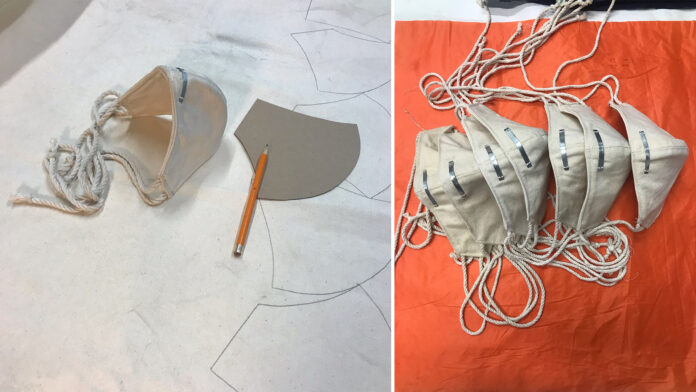Students, professors across UC work to get masks to communities
The UC Davis Medical Center said on April 28 it was no longer taking personal protective equipment donations (PPE) after reaching its goal, barely a month after campus departments and units were told they could donate PPE to UC Davis Health through Distribution and Logistics.
The center credited the accomplishment to its donors, including its international partners, Peking University First Hospital in Beijing and The First Affiliated Hospital Sun-yat Sen University in Guangzhou, China, which donated 400 surgical masks and 16,250 boxes of N95/KN95 masks, respectively.
Shu-qin Ding J.M., the director of the Office of International Affairs at The First Affiliated Hospital Sun-yat Sen University, said in her letter sent along with the equipment that during the pandemic, the thoughts of her and her colleagues were with their friends in the U.S.
“We will always stand together with you to fight the pandemic,” she said in the letter.
Other donors included the College of Agricultural and Environmental Sciences, the first campus donor to the center. The college donated 2,400 face masks, 700 N95 respirators, 200 isolation gowns, 57,000 gloves and other needed items.
College students and faculty have been collecting or making masks for their communities and for health workers as mask shortages become more common and more counties advise using face coverings when leaving the house.
Jennifer Romero, a fifth-year pharmaceutical chemistry major, is a volunteer in charge of donations for Sacramento Street Medicine, an organization that aims to give resources, food and services to unsheltered people. In light of the pandemic, that now includes masks and information.
“Some of them aren’t really informed about what’s going on, because they don’t have ready access to the Internet,” she said. “They’re detached from the real world. It’s a tough time for them right now.”
While Sacramento Street Medicine aimed to donate masks this past Saturday, they were only able to provide food to people experiencing homelessness.
Romero attributed the struggle to get materials to fabric shortages.
“Most of us don’t have sewing machines, and Joanne’s is running out of materials,” she said.
To continue making and distributing masks, theatre departments throughout the UC system have been using existing materials from their costume shops.
Costume designer and UC Davis Theatre and Dance graduate student Tasa Gleaon said in a press release that she had made around 60 face masks for family and friends.
The theatre arts costume shop at UC Santa Cruz coordinated with UC Santa Cruz’s Environmental Health and Safety Department to make 750 shaped fabric masks and 50 neck gaiters. Any extra masks the costume shop’s manager and assistant produce after the project’s needs are met will be sent to the UC medical centers, according to a press release from the university.
At UC Riverside, theatre employees aim to make at least 750 washable face masks that will be free for essential employees. Costume shop assistant Maria Hong said in a press release that sewing — unlike the pandemic — is something she can control.
“If I can help, even in this small way, I am happy to do it,” Hong said. “I am hopeful the masks will help keep someone safe.”
Like Hong, Robin Hill, an art professor at UC Davis, is using her existing skills to make masks. Hill’s masks have gone as far as New York.
Hill said she has been making masks for about three to four weeks and works from the perspective of being an artist who works with what she has on hand.
“My first mask was made from an artist canvas with flexible metal banding,” she said. “I posted on Instagram that I had made this mask and if anyone wanted one, they could direct message me.”
So far, she has made 20 masks, selling them at $10 each with 100% of the proceeds going toward the Yolo County Food Bank.
“What I say about my practice and what I’m doing is that I am turning old studio materials into food for hungry neighbors,” Hill said. “It feels good to feel like I’m doing something other than just sheltering in place for my own and others’ protection. I have something to contribute and can help in my own way.”
Written by: Janelle Marie Salanga — campus@theaggie.org




